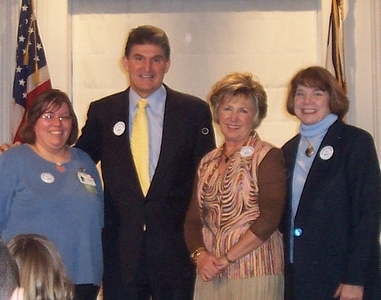SIMERS-MC KOWN ATTEND AFTERSCHOOL DAY AT THE LEGISLATURE

Jean Simers (R) and Barb McKown (L) represent Calhoun's Heads Up Program, shown with Gov. Manchin and First Lady Gayle Manchin
Submitted by Jean Simers
Afterschool program providers and their students joined together at the State Capitol building on Monday, February 18 to support access to high quality out-of-school time programs for all West Virginia families and children.
Governor Manchin and First Lady Gayle Manchin met in the Governor's Reception Room with program directors, staff, volunteers and students from more than 14 programs serving schools and communities from Princeton to Morgantown to the Eastern Panhandle.
More than a dozen afterschool program exhibits and staff from the West Virginia Statewide Afterschool Network were available outside the House chambers throughout the day.
Following the meeting and photo opportunity with Governor and Mrs. Manchin, Senator Plymale and Delegate Reynolds led programs to the galleries of the House and Senate where they will be recognized for providing safe, enriching and academically supportive activities for K-12 students during the school year and summer.
While most West Virginia children, 74%, spend some portion of the hours after school in the care of a parent or guardian, 16% of West Virginia's K-12 youth are responsible for taking care of themselves. These children spend an average of more than 6 hours per week unsupervised after school.
In contrast, only 6% of West Virginia's K-12 youth participate in afterschool programs. On average, afterschool participants spend 8 hours per week in afterschool programs. Participation averages 3.1 days per week for 2 hours per day.
Other care arrangements include traditional child care centers (11%), sibling care (6%) and nonparental adult care, such as a grandparent or neighbor (14%).
More than 27% of the K-12 youth in self-care would be likely to participate in an afterschool program if one were available in the community.
Similarly, 23% of all children not in afterschool would be likely to participate if an afterschool program were available in the community, regardless of their current care arrangement.
Ninety-eight percent of West Virginia parents are extremely or somewhat satisfied with the afterschool program their child attends.
In West Virginia, the top 4 reasons cited for selecting an afterschool program are affordability, child enjoyment, quality of facilities, and convenient location.
Parents of non-participants believe that their children would benefit most from afterschool programs in the following ways: by having fun, academic enrichment, improved physical activity, by staying safe and out of trouble, improved social skills, and by having help completing homework.
In West Virginia, public schools are the largest provider of afterschool programs. Religious organizations, Boys and Girls Clubs, and YMCAs round out the top four providers of afterschool care in the state.
Findings from the America After 3 PM household survey are based on parent/guardian responses to survey questions about after school care arrangements during the 2002-2003 school year. GE Consumer Finance and RTi-DFD conducted the survey and analyzed the data for the Afterschool Alliance, with support from the JCPenney Afterschool Fund. National data and state data are available at www.afterschoolalliance.org.
Research findings continue to document positive outcomes of student participation in high quality afterschool programs including increased school attendance, reduced dropout, improved student performance in math and reading. Benefits to families and communities such as reduced juvenile crime in the afterschool hour and improved worker attendance and enhanced balance between work and family life have also been reported. (Afterschool Fact Sheet, Afterschool Alliance, http://www.afterschoolalliance.org )
The "Promising Afterschool Programs" study released in October 2007 by researchers Deborah Vandell and Kim Pierce of the University of California-Irvine and Elizabeth Reisner of Policy Studies Associates examined 35 programs judged to be of "high quality" that serve nearly 3,000 low-income children across the nation. Following two years of study, researchers concluded that "regular participation in high-quality afterschool programs is linked to significant gains in standardized test scores and work habits as well as reductions in behavior problems among disadvantaged students" (www.gse.uci.edu/research_SPASP.php ).
The West Virginia Statewide Afterschool Network (WVSAN) works to identify and network program providers and supporters, to improve the quality of out-of-school time programs through training and information sharing, and to support the development of policies and funding to achieve wider access to and sustainability of high quality afterschool programs. For more information call the West Virginia Statewide Afterschool Network at 304-720-9882 or e-mail Jane Hange, Director at Jane.Hange@mail.wvu.edu. More information on afterschool programs nationwide is available at www.afterschoolalliance.org.